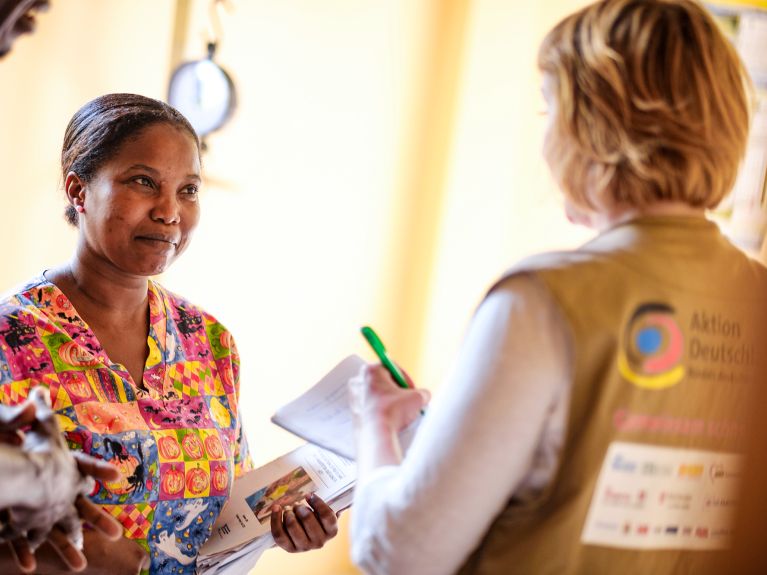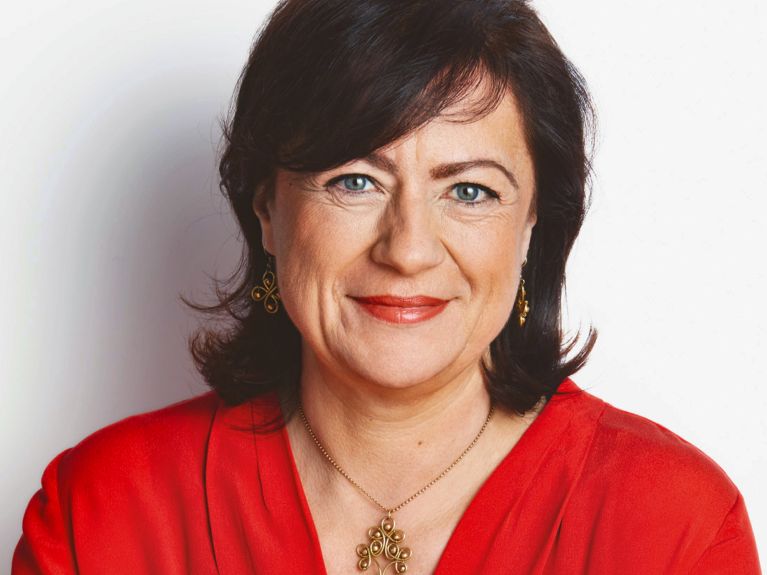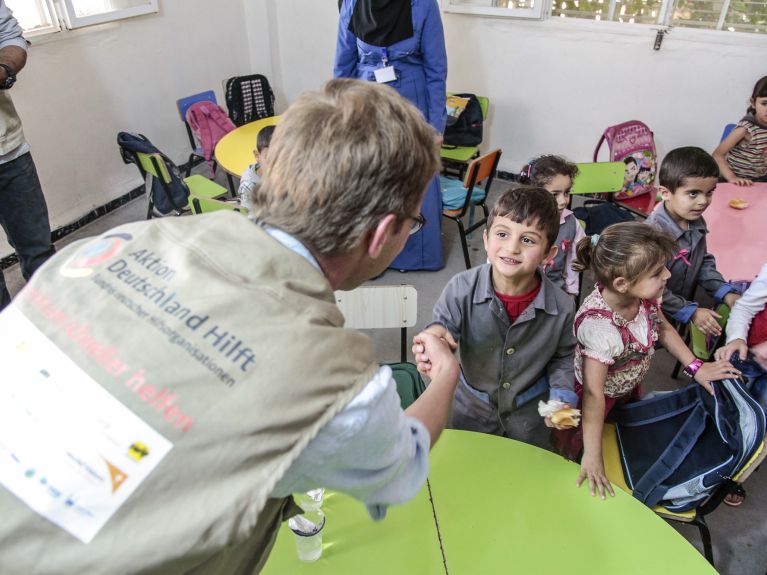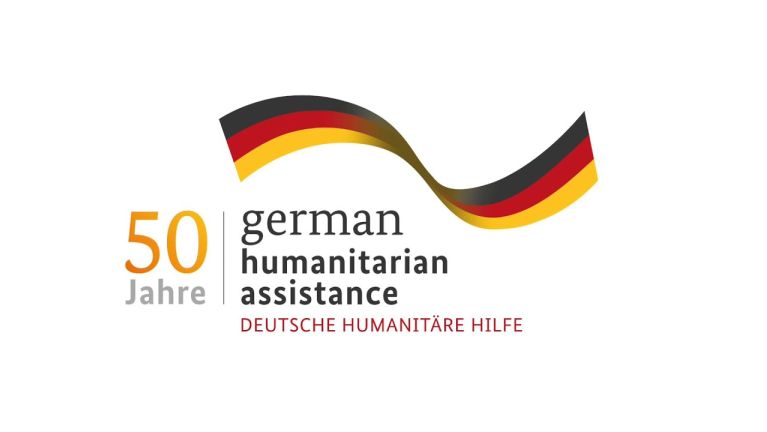Forward-looking, anticipatory help
Worldwide increasing numbers of people are reliant on humanitarian aid. How Germany helps and responds to new challenges.

Since 2016 Bärbel Kofler has been the Federal Government Commissioner for Human Rights Policy and Humanitarian Aid. We talked to her about how Germany is responding to the new challenges in humanitarian aid.

Ms. Kofler, humanitarian aid has been a cornerstone of German foreign policy for over 50 years now. In April 2019 the Federal Foreign Office presented a new strategy. What has changed?
The Federal Foreign Office published the first Strategy on Humanitarian Aid abroad in 2012. Since then there have been numerous changes and developments within the international humanitarian system. The World Humanitarian Summit 2016 and the “Grand Bargain” launched there have effectively shaped new initiatives within the international humanitarian system. A key aspect of the agreement was that Germany and the other signatories committed themselves to enhance the effectiveness and efficiency of humanitarian aid.
In recent years there has been a constant increase in the number, duration and complexity of humanitarian crises. In addition, there is a growing tendency for such crises to be forgotten. Conflicts, natural catastrophes and epidemics mean there is a rising need for humanitarian aid and this calls for new approaches.
Germany’s role as a humanitarian player has also altered. Currently, Germany is the second-largest donor of bilateral assistance. We accept this responsibility and will continue to help shape the international humanitarian system in future. Humanitarian aid is an integral part of German foreign policy, something I myself repeatedly support. With its new strategy the Foreign Office has not only underlined once more what shape German humanitarian aid should take – with an approach based on partnership and committed to humanitarian principles – but also defined the areas we should focus on.
And what are the current focal areas?
Germany is committed to the humanitarian system as a whole and is active in many different areas. Naturally, priorities are set. These include the protection of refugees and displaced persons, and their numbers are growing worldwide. The Federal German Government will continue to be strongly involved in implementing the Global Compact on Refugees and tailor its humanitarian aid in this area accordingly.
Germany is committed to a paradigm shift. It wants to move away from merely responding to humanitarian aid and instead embrace forward-looking aid.
Similarly, climate change and natural disasters lead to ever greater humanitarian needs. Which is why for several years Germany has been advocating a paradigm shift in humanitarian aid: Not simply responding to humanitarian crises but forward-looking and anticipatory assistance. We will continue with and expand our disaster readiness. And together with our humanitarian partners we not only want to elaborate solutions for extreme weather events but also for those disasters that develop over time like droughts.
Dieses YouTube-Video kann in einem neuen Tab abgespielt werden
YouTube öffnenThird party content
We use YouTube to embed content that may collect data about your activity. Please review the details and accept the service to see this content.
Open consent formHas it become more difficult to provide humanitarian aid in unstable regions?
In the conflicts we encounter today in crises we are observing a widespread disregard for humanitarian principles and human rights law. This greatly hampers humanitarian aid workers in actually reaching the needy and makes it more difficult to implement relief efforts. Germany will continue to emphatically advocate better humanitarian access. This is something it is focusing on as a current member of the UN Security Council.
As a responsible donor Germany will also stand up for the maintenance of “humanitarian space” and the protection of humanitarian aid workers. Closely connected with this is its engagement for forgotten crises, which will also be continued.
Not least of all Germany also advocates innovation in humanitarian aid. This includes technical developments but also new approaches and networking actors from science, business, politics and humanitarian aid. We also place importance on involving local humanitarian actors and their own ideas.
You can read more about current challenges for humanitarian aid here
How does Germany collaborate with local and international partners in the operational areas ?
Germany has an approach to its work based on partnership and takes into account the broad spectrum of the humanitarian actors. The latter include in particular the UN organisations, the International Red Cross and Red Crescent Movement but also international NGOs. This means donations and aid are passed on to the local and national actors as quickly as possible. In 2018 this was the case for some 20 percent of aid.
Aside from financial support by local and national actors in order to fulfil the commitments enshrined in the “Grand Bargain” other aspects relevant to localisation include a better predictability of the support through multi-year financing commitments but also the efficient strengthening of capacity say through training and further training offers for personnel as such measures will effectively strengthen the role of these actors in the humanitarian system. In particular with a view to multi-year financial commitments and the reliability this produces Germany has already made immense progress and meanwhile grants most of its funding for a period of over a year. Strengthening the capacity of local and national actors is a firm component of regional projects.

How does Germany provide preventive humanitarian aid?
As regards emergency relief including immediate assistance, preventative humanitarian aid has established itself as an indispensable aspect of the Federal Foreign Office’s humanitarian aid efforts. Our preventative humanitarian aid disaster measures and the improvement of early warning systems play a key role in especially endangered countries or regions.
It is particularly important to strengthen the responsiveness of local humanitarian actors. We support them intensively in reducing risks, improving early warning systems and getting effectively prepared for disasters.
In mid-May in my capacity as Federal Government Commissioner for Human Rights Policy and Humanitarian Aid I attended the Global Platform for Disaster Risk Reduction in Geneva along with over 4,000 participants from 170 countries. Founded in 2006 the Platform is the most important global UN forum for the strategic guidance, coordination and review of the implementation of goals relating to international disaster prevention and disaster risk management.
Interview: Tanja Zech
You would like to receive regular information about Germany? Subscribe here:


